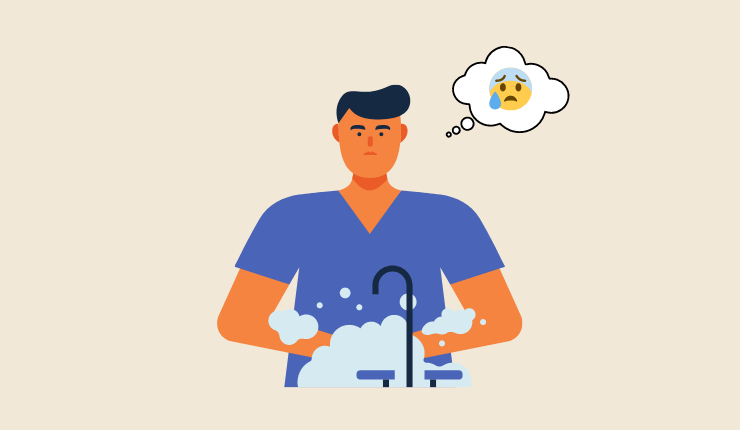When my hot water heater was on the blink, I didn’t think I’d be able to get my dishes clean. Then it occurred to me: Why not wash dishes with cold water?
I always assumed that cold water would be ineffective in terms of getting dishes clean. As it turns out, there are pros and cons to washing dishes this way. I’ll discuss the most common ones in this guide.
Here’s a preview of what you can expect to learn here:
- Whether cold water is effective at removing germs, dissolving proteins, or removing grease
- What benefits hot water has to offer that cold water doesn’t
- Which solution is more cost-effective
- Other practical concerns
If you’ve ever been coaxed into washing dishes in water that felt scalding hot, my guide can provide you with some useful feedback.
Mom: just close the cold water tap and wash the dishes, the water is not that hot
The water: pic.twitter.com/Pl7bcNt6oO
— Ntando (@Just_Nandos) August 18, 2021
I came to learn that hot water is better for washing dishes that are greasy or especially filthy, but cold water can work in a pinch. I hope this information — along with the rest of the tips I’ve included — will be useful!
Should You Wash Dishes with Cold Water? Pros and Cons
- 1. Pros →
- 1.1. Protein Dissolutions →
- 1.2. Convenience →
- 1.3. Cost →
- 2. Cons →
- 2.1. Sanitation →
- 2.2. Residue →
- 2.3. Effort →
- 2.4. Drying →
- 2.5. Health →
- 3. What’s the Ideal Water Temperature for Washing Dishes? →
- 4. Tips and Techniques →
- 5. Useful Resources →
Pros
Using cold water is better than opting not to wash the dishes at all, which would be the alternative.
Let’s take a closer look at the benefits of using cold water to wash dishes.
Protein Dissolution
You might be surprised to learn this, but cold water dissolves proteins better than hot water.
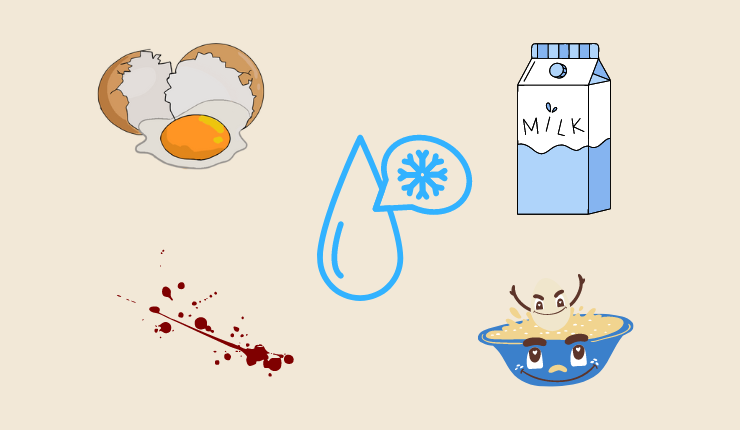
It makes sense when you think about it. After all, we use cold water to wash clothing items that have been stained with blood, don’t we? Hot water would cause the proteins to cling to the fabric instead of removing them.
If you’ve prepared eggs or other protein-rich ingredients, wash dishes and other utensils using cold water. For excessive grease (see Cons, below), stick to hot water.
Looking for recipe ideas as well as cleaning tips? You can find some excellent dessert options in this article.
Convenience
When I’m camping, I don’t want to bother with heating water to wash dishes. And most of the time, I can get away with it. Roughing it means doing without some of the daily luxuries that we take for granted.

Similarly, if you’re waiting for your hot water heater to be fixed, it’s fine to run cold water to wash dishes. That’s how I found myself researching the topic to begin with.
The Chicago Tribune is already on top of this technique:
Some restaurant owners prefer washing dishes by hand instead of using dishwashing machines to clean the toughest muck. And health officials already have embraced the cool-water-and-dish-sanitizer concept.
One tip: Try using sand or gravel to scour greasy dishes before you wash them. This comes in especially handy when there’s no hot water available.
Cost
Every time your hot water heater kicks on, you’re using more energy than you would if you ran the cold faucet instead. When you wash dishes with cold water, you’ll save energy and money.

This tip might come in handy during the summer months, when it can be unpleasant to dip your hands in a basin of hot water. Just make sure to keep the other guidelines I’ve mentioned in mind.
Cons
Most people opt for hot water when washing dishes, myself included. Hot water acts as a disinfectant, and most dish detergents are more effective when the water temperature is higher.
Sanitation
Does cold water remove germs? That’s the first question I asked myself when I was considering this method.
I just found out that one of my friends uses cold water to wash his dishes. Disgusting!
— Cannabis Farmer: Jim Belushi (@JimBelushi) June 28, 2021
Actually, when you wash dishes, the detergent is the primary instrument when it comes to removing the germs. The water is just a vehicle for the soap, so it doesn’t matter so much whether the water is cold or hot.
That said, most dish detergents are more effective when you use hot water. If you’re shopping for a product and you know you don’t plan on heating the water to wash dishes, try to find one that will work just as well with cold water.
If you’re interested in learning more about this method, check out this helpful video:
Residue
The second most important question: Does cold water remove fat and grease?
Hot water is more effective in this regard. When you wash dishes in hot water, the heat loosens up the grease, giving the detergent something to latch on to. Then, when you rinse the dishes, the detergent sloughs off, taking the grease along for the ride.
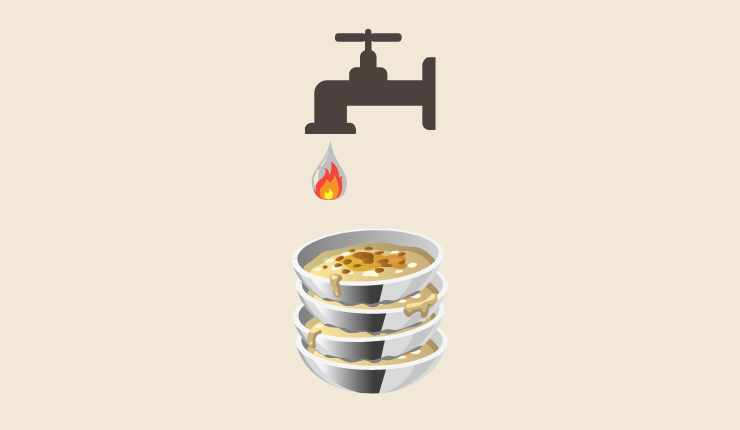
Bear in mind that the soap can only latch on to the surface area of the grease. Since the hot water acts as a thinner, creating a greater surface area, more of the grease will be eliminated as a result.
The Yard & Garden Guru has this to say on the subject:
The benefit of hot water extends beyond greasy dishes. Hot water offers a higher cleaning capacity than cold water, even for non-greasy dishes.
Also, be aware that when the water is cold, the surface of your dishes might have a cloudy appearance. It might even leave behind a soapy residue, since most detergents don’t dissolve well in cold water.
In short, if your dishes are greasy or have viscous stains on them, it’s better to find some way to heat the water. You might be able to get away with the “sand or gravel” trick I mentioned earlier, but you’re better off using hot water to wash dishes that are excessively greasy or dirty.
https://twitter.com/whoissd/status/1356815982052864000
You can find more information about removing stubborn residue from pans and dishes here.
Effort
When you wash dishes with cold water, you’ll need to do a lot of scrubbing.
Hot water is more effective at dissolving dirt particles, which is a big reason why people opt for hot water when they wash dishes. What’s more, the molecules move more quickly, making it easier for the water to break the hold that the dirt has on the dishes.
Come armed with plenty of elbow grease if you plan to wash dishes using cold water. You might even find that you enjoy the exercise.
Drying
Cool water won’t dry as quickly as hot water, which means you may have to wait longer before putting the dishes away. You can get around this issue by using a towel to dry them, but even then, you might have a hard time getting all the water off.
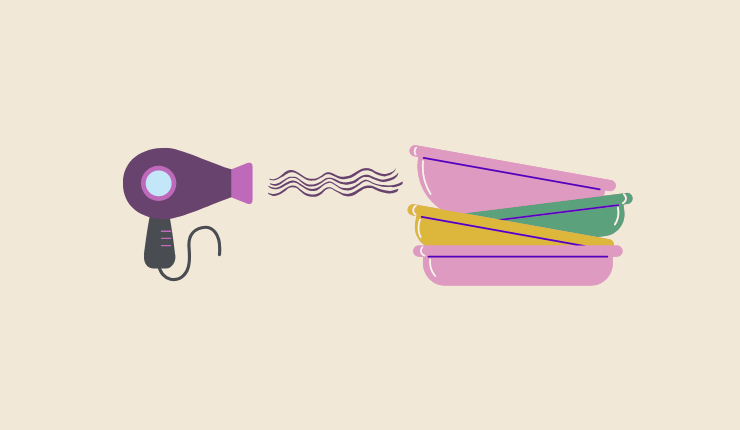
Honestly, I haven’t found this to be much of an issue, but that might be because I tend to procrastinate when it comes to putting dishes away. However, it’s something to be aware of, especially if you wash dishes in huge batches.
In fact, studies have shown that drying the dishes is more important than washing them in water that’s super hot. Bacteria thrive in damp environments, so if you dry the dishes immediately, you can eliminate a great deal of it.
Health
Can you get sick when you wash dishes with cold water? What about the practical concerns of dipping your hands in and out of the cold liquid—will you have to worry about dry and cracked skin?

As long as you use dish detergent, you shouldn’t have to worry about getting sick from lingering bacteria. This is true whether you wash dishes in cold or hot water.
As far as your skin is concerned, hot water may actually be more damaging than cold. When the water is cold, it may even boost circulation. This is why many people use cold or cool water to wash their faces.
What’s the Ideal Water Temperature for Washing Dishes?
If you’ve been using scalding water to wash dishes, you can dial it down a few degrees. According to experts, the water doesn’t need to be any hotter than 80 degrees in order to get the job done.
Most of the water that comes out of your kitchen’s tap will run from 104 to 131 degrees. While 130-degree water can kill some bacteria, it will also scald your hands if they’re exposed to it for long enough.
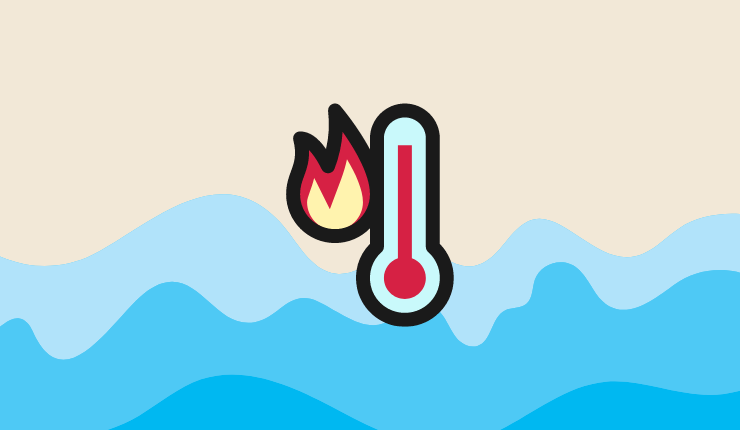
To give you some idea of how hot 130 degrees is, prime rib is considered done when it reaches this internal temp. Click here to learn more.
If given the choice, you should use water that’s warm, but not excessively hot. As I mentioned, it’s the soap, not the water, that kills most of the germs you have to worry about.
Tips and Techniques
If you’re wondering how to wash dishes without hot water, here’s the best way to go about it.
Add detergent to the water and swirl it around. This will create suds that will help you clean the dishes more effectively.
Scrub dishes with the abrasive side of a soft sponge, then rinse thoroughly. If you’re worried about sanitation, create a solution using 1 tablespoon of bleach for 1 gallon of water. Dip the dishes and utensils in the solution, rinse again, and pat dry.
If you’re interested in washing dishes effectively, take a look at this video tutorial:
Here are a few other dishwashing tips:
- Rinse dishes beforehand to remove any stubborn debris.
- Wash glasses and silverware first, then tackle larger dishes.
- Replace sponges and scrubbers at least twice a month, depending on how often you cook and wash dishes.
- Don’t be tempted to overdo it on the soap—or the water, for that matter. To learn more, check out this video:
Useful Resources
In Conclusion
Can you wash dishes with cold water? Absolutely, as long as you use a high-quality dish detergent. Whether you’re dealing with a broken hot water heater or you just want to try something new, it shouldn’t do any harm to use this method.
- Lava Rocks Vs. Fire Glass – What Is Better for a Fire Pit? - November 15, 2023
- How to Light a Propane/Gas Fire Pit with a Manual or Electronic Ignition System - November 8, 2023
- How Long Does a Propane Tank Last for a Fire Pit - October 9, 2023

